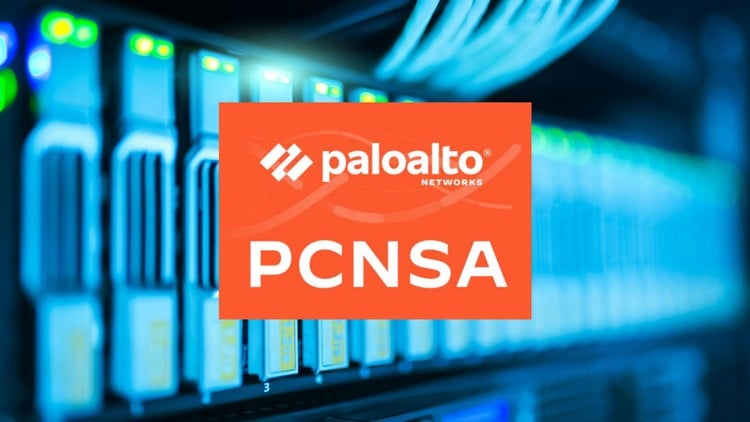
High-quality practice exams to boost confidence, identify weak areas, and prepare you for real test success
👥 17 students
Add-On Information:
Note➛ Make sure your 𝐔𝐝𝐞𝐦𝐲 cart has only this course you're going to enroll it now, Remove all other courses from the 𝐔𝐝𝐞𝐦𝐲 cart before Enrolling!
-
Course Overview
- This comprehensive course meticulously prepares you for the Palo Alto Networks Certified Network Security Administrator (PCNSA) examination, validating your foundational understanding of the Next-Generation Firewall (NGFW) platform. It delves into the core functionalities and operational principles required to effectively deploy, configure, and manage these industry-leading security appliances. You will gain expertise in leveraging PAN-OS capabilities to protect modern enterprise networks from sophisticated cyber threats, covering initial setup through advanced security policy enforcement and threat prevention. With a strong emphasis on practical application, the curriculum ensures proficiency in implementation, equipping network security professionals, administrators, and engineers with critical skills. The course’s unique value is enhanced by high-quality practice exams, specifically crafted to boost confidence, identify weak areas, and thoroughly prepare you for real test success, mirroring the actual certification exam. This focused approach, proven by our 17 dedicated students, ensures a high probability of certification achievement and practical job readiness.
-
Requirements / Prerequisites
- A foundational understanding of general networking concepts, including TCP/IP, routing, and switching principles, is highly recommended to fully grasp the course material.
- Familiarity with basic security concepts such as firewalls, Virtual Private Networks (VPNs), and common cyber threats will provide a beneficial starting point.
- While not strictly mandatory, prior exposure to command-line interfaces (CLIs) or general network device administration can aid in quicker assimilation of certain configuration tasks, though the course primarily focuses on the intuitive web-based GUI.
- No prior specific experience with Palo Alto Networks products is required, as this course is designed to build expertise from the ground up for aspiring PCNSA administrators.
-
Skills Covered / Tools Used
- Palo Alto Networks Next-Generation Firewalls (NGFWs): Gain hands-on experience with the leading cybersecurity platform’s architecture and operational modes.
- PAN-OS Operating System: Master the web interface (GUI) and foundational CLI commands for configuration, monitoring, and troubleshooting.
- Initial Device Setup & Licensing: Learn initial device configuration, interface types (L2, L3, Virtual Wire), zone creation, and license management.
- Security Policy Configuration: Develop expertise in crafting granular policies controlling traffic based on applications, users, content, and threats.
- Network Address Translation (NAT): Implement Source NAT (SNAT) and Destination NAT (DNAT) policies for secure segmentation and resource access.
- Application Identification (App-ID): Leverage App-ID technology to identify and control applications regardless of port, protocol, or evasive tactics.
- User Identification (User-ID): Integrate firewalls with directory services (e.g., Active Directory, LDAP) to enforce user-based security policies.
- Content-ID & Threat Prevention: Configure threat prevention profiles including Antivirus, Anti-spyware, Vulnerability Protection, and URL Filtering.
- WildFire Integration: Utilize WildFire cloud-based threat analysis for identifying and preventing zero-day exploits and advanced malware.
- VPN Technologies: Implement and troubleshoot Site-to-Site IPSec VPNs and GlobalProtect for secure remote access.
- SSL Decryption Policies: Configure SSL forward proxy and inbound inspection to decrypt and inspect encrypted traffic for hidden threats.
- Monitoring, Logging & Reporting: Utilize ACC, traffic logs, threat logs, and custom reports for comprehensive network visibility.
- High Availability (HA): Configure Active/Passive HA setups to ensure continuous network security and minimize downtime.
- DoS & Zone Protection: Implement Denial-of-Service (DoS) and zone protection profiles to safeguard against common network attacks.
- Policy-Based Forwarding (PBF): Understand and configure PBF for advanced traffic steering.
-
Benefits / Outcomes
- Achieve PCNSA Certification: Successfully pass the Palo Alto Networks Certified Network Security Administrator exam, earning a highly respected credential.
- Enhanced Career Prospects: Significantly boost employability and career advancement opportunities in network security.
- Practical Expertise: Gain hands-on, actionable skills to confidently deploy, configure, and manage Palo Alto Networks NGFWs.
- Robust Threat Defense: Develop deep understanding of implementing multi-layered security protections against cyber threats.
- Strategic Network Security: Learn to design and implement robust security policies aligned with organizational objectives.
- Vendor-Specific Mastery: Become proficient in a leading cybersecurity vendor’s platform, setting a strong foundation.
- Confident Administration: Build confidence to perform essential firewall administration tasks, including monitoring and troubleshooting.
-
PROS
- High Market Demand & Recognition: Palo Alto Networks is a market leader, making expertise in their products highly sought after; the PCNSA is a respected, industry-recognized credential.
- Practical, Real-World Skills: The course focuses on configurations and operational tasks directly applicable to managing live firewall deployments.
- Strong Foundation for Advancement: Serves as an excellent stepping stone for pursuing more advanced Palo Alto Networks certifications like the PCNSE.
- Effective Exam Preparation: The included high-quality practice exams are invaluable for solidifying knowledge and maximizing success on the certification test.
-
CONS
- Vendor-Specific Focus: Concentrated on a single vendor’s technology, which might limit exposure to broader cross-platform security concepts.
Learning Tracks: English,IT & Software,IT Certifications
Found It Free? Share It Fast!